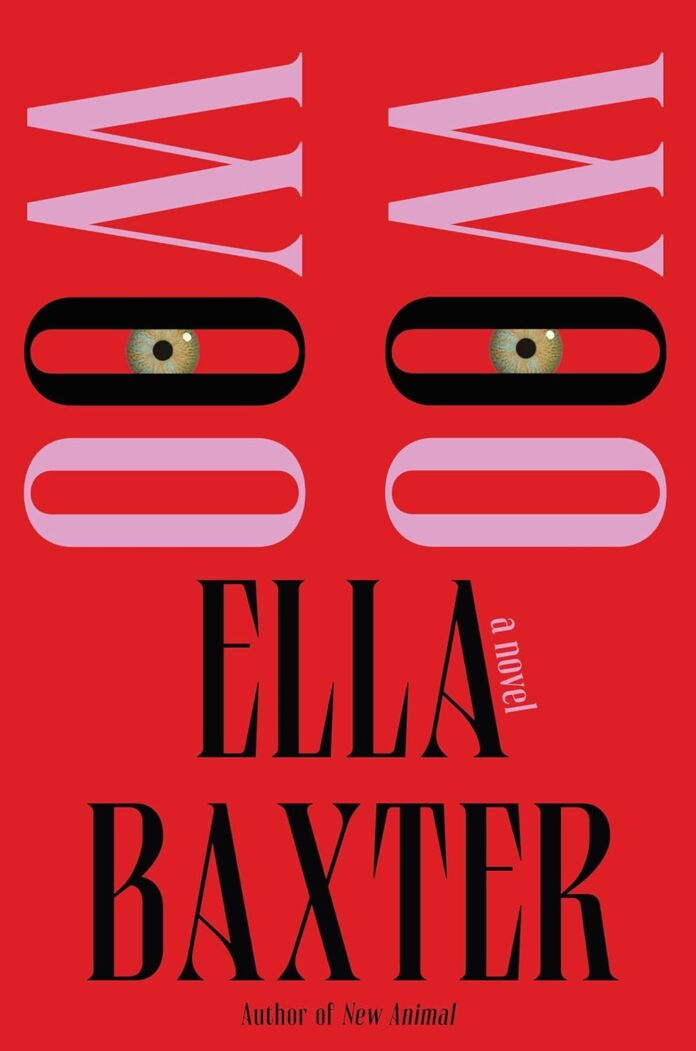In her sophomore novel Woo Woo, Australian author Ella Baxter crafts a peculiar and sometimes unsettling exploration of artistry, validation, and the increasingly blurred lines between performance and authenticity in our hyper-connected world. Following her debut New Animal, Baxter continues to probe the darker corners of human experience, this time through the lens of conceptual art and digital performance.
The Artist’s Struggle
At the center of this feverish narrative is Sabine, a conceptual artist preparing for a pivotal exhibition titled “Fuck You, Help Me.” Sabine creates gothic “skins”—wearable puppets featuring prosthetic faces that she positions over her own in eerie self-portraits. Her work involves hanging naked from various urban structures at night while wearing these uncanny costumes, capturing the results in photographs that blur the lines between vulnerability and defiance.
The novel’s strength lies in its unflinching portrayal of an artist’s psychological state leading up to a major exhibition. Baxter masterfully conveys the crushing weight of imposter syndrome, the desperate need for validation, and the sometimes toxic relationship between creator and audience. Through Sabine’s increasingly erratic behavior and obsessive documentation of her life on social media, we witness the slow dissolution of the boundary between art and artist.
Style and Structure
Baxter’s prose is both visceral and dreamlike, perfectly matching Sabine’s increasingly unstable mental state. The writing alternates between sharp observation and hallucinatory passages, particularly when the ghost of feminist performance artist Carolee Schneemann appears to offer cryptic guidance. These supernatural elements, while occasionally heavy-handed, serve to underscore the novel’s themes about artistic lineage and the price of creation.
Strengths and Weaknesses
The novel excels in its depiction of:
- The complex dynamics between artists and their audience
- The toll of constant digital performance
- The intersection of art and personal trauma
- The pressure of maintaining artistic relevance
However, several aspects of the novel fall short:
- The stalker subplot feels underdeveloped and sometimes serves more as a plot device than a genuine threat
- Secondary characters, particularly Constantine (Sabine’s husband), often feel two-dimensional
- The supernatural elements occasionally border on gimmicky
- The resolution feels somewhat rushed and unsatisfying
Themes and Commentary
Woo Woo by Ella Baxter grapples with timely themes about authenticity in the age of social media and the commodification of personal experience. Sabine’s compulsive live-streaming and need for constant validation from her followers serves as a sharp commentary on contemporary art practices and the pressure to maintain an online presence.
The novel also explores gender dynamics in the art world, though sometimes in ways that feel obvious rather than insightful. The ghost of Carolee Schneemann, while an interesting device, occasionally delivers feminist commentary that borders on didactic.
Comparative Context
Readers familiar with Baxter’s debut New Animal will recognize her preoccupation with body horror and dark humor. However, where New Animal dealt with grief and mortality, Woo Woo focuses on creation and performance. The novel sits comfortably alongside works like Ottessa Moshfegh’s My Year of Rest and Relaxation and Alexandra Kleeman’s Something New Under the Sun in its exploration of female artistic identity and mental instability.
Technical Execution
The novel’s pacing is uneven, starting strong but occasionally getting bogged down in repetitive scenes of Sabine’s neurotic behavior. The climactic sequence involving a pig mask and performance art is simultaneously the book’s most compelling and most frustrating section—brilliant in its fever-dream intensity but somewhat opaque in its meaning.
Impact and Significance
Despite its flaws, Woo Woo by Ella Baxter makes a valuable contribution to contemporary discussions about art, authenticity, and female creative expression. Baxter’s willingness to engage with uncomfortable questions about the relationship between art and exploitation, between performance and truth, makes for challenging but worthwhile reading.
Final Verdict
Woo Woo by Ella Baxter is an ambitious and often compelling novel that doesn’t quite reach the heights it aspires to. While Baxter’s prose is consistently engaging and her exploration of artistic anxiety is spot-on, the novel’s various elements don’t fully cohere into a satisfying whole.
Recommended for:
- Readers interested in contemporary art and performance
- Fans of experimental literary fiction
- Those who enjoy exploring themes of identity and authenticity
- Readers who appreciate dark humor and surreal elements
May not appeal to:
- Those seeking traditional narrative structures
- Readers who prefer clearly resolved plots
- Those uncomfortable with body horror elements
- Readers looking for light or uplifting content
Conclusion
Woo Woo by Ella Baxter is a bold, if imperfect, examination of art-making in the digital age. While it sometimes stumbles under the weight of its ambitions, Baxter’s raw energy and unflinching gaze make for an engaging, if occasionally frustrating, reading experience. The novel serves as a compelling document of our current moment, where the lines between performance and authenticity, between art and life, continue to blur in increasingly complex ways.





